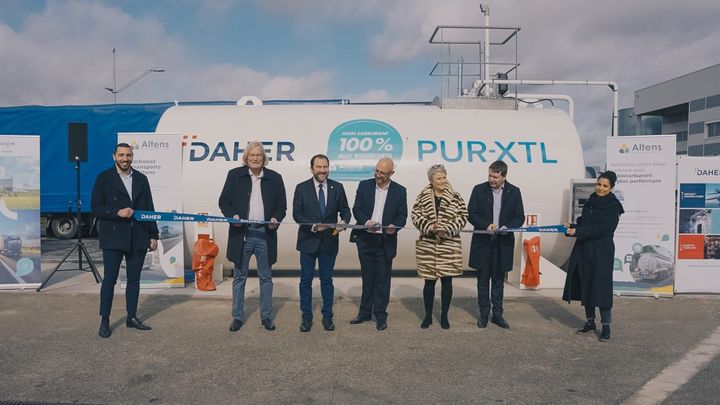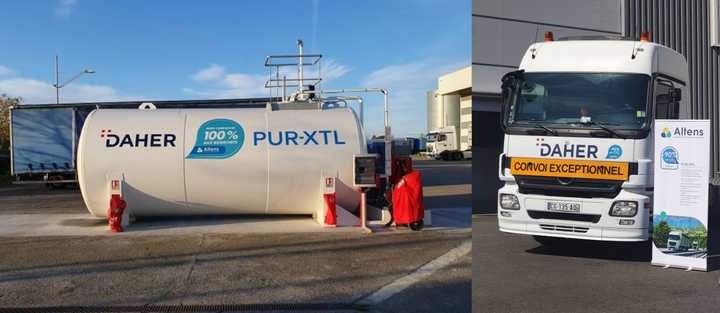Daher accelerates the decarbonization of its logistics activities
02/24/2023
The company has installed the first PUR-XTL biofuel tank at its Corlog logistics hub near Toulouse, France

From left to right: Alain Toppan, Mayor of Cornebarrieu; Vincent Garel, Regional Councillor, Chairman of the “Mobility and Infrastructure” Commission; Arnaud Joerger, Daher Transport Director; Julie de Cevins, Daher SVP Nuclear, Transport & Projects; and Etienne Valtel, CEO, Altens.
Reducing its carbon footprint along with the improvement of customer satisfaction: this is the dual challenge set out in Daher’s Take Off 2027 strategic plan for the next five years. Today’s unveiling of a PUR-XTL biofuel tank to fuel its truck fleet at Daher’s Cornebarrieu, France facility near Toulouse is another high-profile illustration of the Group’s determination to accelerate the decarbonization of its logistics activities. The PUR-XTL biofuel tank installation marks a key step in the ongoing rollout of the Group’s preferred biofuel, which began at the end of last year. Such green fuels – made from waste residual oils and greases – can reduce vehicle CO2 emissions by up to 90%.
Logistics is one of Daher’s high-profile sectors in and around the Toulouse area, where the Group provides a broad range of services – including receiving, warehousing and preparing aircraft sub-assemblies for delivery to a number of different Airbus assembly lines.
As an example, the route used by Daher to transport engines and aircraft components from Toulouse to Airbus production plants in Hamburg, Germany accounts for 60% of the 3.5 million kilometers traveled annually by the Daher truck fleet.
Today’s unveiling of its first PUR-XTL biofuel tank at the Corlog logistics hub in Cornebarrieu is another persuasive illustration of Daher’s determination to make a serious contribution to the emergence of a more eco-responsible model for logistics. This is a focus for the work done at Log’In, which is Daher’s French logistics industry innovation center that opened a few months ago on the same site with financial support from the French government and the Occitanie region.
With an average of between 25 and 35 liters of diesel used per 100 kilometers driven (the actual amount depends on load weight), road transportation is one of the largest CO2 emitters in the supply chain. This fact was the trigger that encouraged Daher to research a new solution that could reconcile logistics efficiency with environmental performance. With a program that began at the end of last year, Altens PUR-XTL biofuel is being gradually rolled out to fuel all Daher diesel-powered trucks, reducing their CO2 emissions by up to 90%.

Since biofuels are not readily available at roadside pumps, Daher took the decision to install the 30,000-liter tank at its Cornebarrieu logistics hub to fuel its truck fleet with PUR-XTL, and use the same fuel for all local trips. This initial €50,000 investment comes with a 10% cost premium over conventional fuels, and reflects Daher’s unwavering commitment to begin reducing its carbon emissions immediately with the help of both innovative and mature solutions.
The Group will install a second fuel tank at its Roissy site (near Paris’ Charles de Gaulle Airport) next year to provide biofuel for local trips, and create a 100%-biofuel route between Toulouse, Roissy and Hamburg – which accounts for 80% of the distance covered annually by Daher’s truck fleet. Trucks traveling from Hamburg will be able to source their fuel from German filling stations, which will begin serving biofuels this year.
Altens, which specializes in 100% renewable alternative fuels, is facilitating the decarbonization of Daher’s transportation operations through the use of its PUR-XTL fuel, which is fully compatible with all diesel-engine trucks. It requires no vehicle conversion work and delivers like-for-like response and performance, compared with conventional diesel. Developed out of the circular model, this biofuel is produced from recycled edible oils, animal fats and other residual materials. It delivers the same level of power as conventional diesel, with no change in fuel consumption and no need for additional maintenance. The new tank and its associated systems have been installed at Daher by Altens, which will also make the fuel deliveries required to keep the tank topped up. The Occitanie/Pyrénées-Méditerranée Regional Council is fully committed to facilitating the transition to cleaner multimodal transport through options that include biofuels, electric vehicles and hydrogen power, and supporting the initiatives of major regional businesses like Daher.
“The progressive introduction of PUR-XTL biofuel to power our entire fleet of vehicles reflects our determination to decarbonize our logistics activities, in just the same way as the projects now underway at our Log’In innovation technical center, which focuses on developing tomorrow’s logistics. Driving innovation for decarbonization is one of the five priorities of our new Take Off 2027 strategic plan. This initiative will significantly reduce our transportation-generated CO2 emissions, at the same time as helping our customers to reduce their carbon footprints.”
Julie de Cevins, Senior Vice President Nuclear/Transport & Projects, Daher
“Using this biofuel reduces CO2 emissions by up to 90%, and NOx emissions by 65% without any need to modify or convert our trucks. It’s not only a significant environmental gain for the Group, but also a matter of pride for our drivers in the knowledge that they’re driving such clean vehicles.”
Arnaud Joerger, Head of Transportation at Daher
“We’re delighted to have this opportunity of helping Daher to decarbonize its fleet. Approved at European level, our PUR-XTL fuel means that Daher can drive green in France right now, and will soon be able to extend that into Germany. This agreement reflects our ambition to accelerate transportation industry decarbonization by offering a range of application-specific alternative fuels to reduce greenhouse gas emissions.”
Etienne Valtel, CEO, ALtens
“As a fervent advocate of the eco-economy, I very much welcome the decarbonization commitment adopted by companies like Daher, and those that promote it, such as Altens. In today’s socio-economic environment, and with the imminent implementation of the European Corporate Sustainability Reporting Directive (CSRD), companies must either take action on, or accelerate, their eco-transition. The Occitanie Region has set itself the ambition of becoming Europe’s first energy-positive region by 2050 as a result of implementing its Green Pact. Which is why we are supporting craft-based businesses, retailers, companies and communities in their quest to achieve sustainability.”
Vincent Garel, Regional Councilor and President of the Occcitanie Mobility and Infrastructures Committee